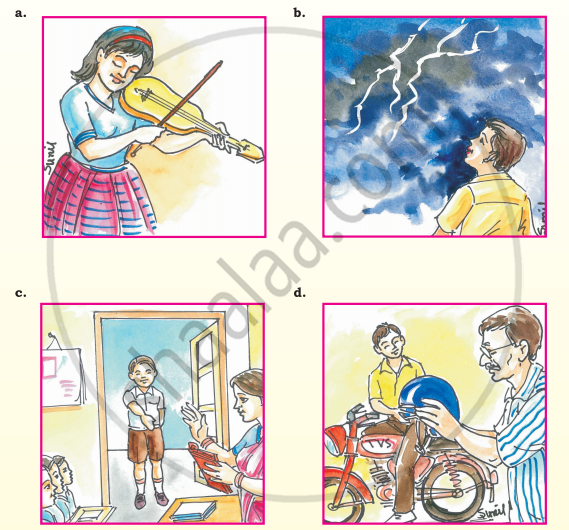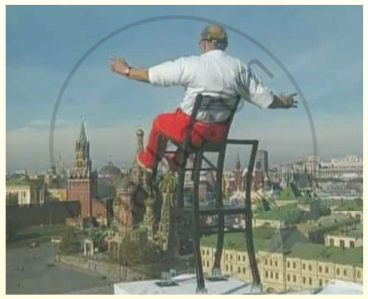Advertisements
Advertisements
Question
Match the highlighted portions or the dialogues with the attitudes and functions denoted by the modals used in them.
Dialogue Attitudes and functions
a) ...... he can write offering (help)
b) ....... would you please pass .... . necessity
c) ........ you must not ......... . requesting
d) shall I do .......... . asking for permission
e) she may come ......... . advising
f) ....... It'll be the maid. logical deduction
g) ........ you must consult ....... . ability
h) May I leave ............. . possibility
Solution
Dialogue Attitudes and functions
a) ...... he can write ability
b) ....... would you please pass .... . requesting
c) ........ you must not ......... . advising
d) shall I do .......... . offering (help)
e) she may come ......... . possibility
f) ....... It'll be the maid. logical deduction
g) ........ you must consult ....... . necessity
h) May I leave ............. . asking for permission
APPEARS IN
RELATED QUESTIONS

Now complete the following dialogues using only one word for each blank on the basis of the pictures given above.
a) Manav: Suma is playing the violin very well.
Priya Yes; _________you play any musical instrument?
Manav: I ________. But I have learnt vocal music.
b) Peter : It's suddenly become dark.
Nandiya : Yes; Thick clouds have gathered in the sky. It
_______ rain this evening.
c) Abdullah : Ma'm , I'm a little late.
________I enter the class?
Teacher : You _________I'm afraid late coming has become a habit with you.
d) Father : Take this. You_______ not forget to wear your helmet while riding your motorbike.
Son : Thanks, Dad. I forgot to pick it up.
The words that you have used to fill in the blanks denote certain attitudes and functions. Match column (A) with column (B) for the dialogues that you have completed.
|
A Attitudes and Functions |
B Dialogues |
|
|
| The words that you have used are called MODALS. They belong to a large category of auxiliary verbs, i.e. helping verbs that cannot be used on their own, but to be used in conjunction with other main verbs. |
Look at the following sentences:
a) He needn't come to office tomorrow.
b) He needed permission to take a day off.
What is the difference in the use of 'need' between the above sentences?
• In sentence (a) 'need' is used as a _____ verb because ______
• In sentence (b) 'need' is used as a _____ verb because ______
a) are followed by a main verb in its bare infinitive form (e.g. I must go) |
Complete the following conversation choosing the most appropriate option from those given in the box. There can be more than one option for some of the blanks.
Gautam : I heard that Rahim (1) ______ open a garment shop, though he is a little uncertain.
Sheela : He (2)_______ not plunge into another business proposition; (3) _______ forget the colossal failure of his last business venture.
Gautam : You (4)________ not have any worry on that count. He (5)________ not be investing any money. His uncle is providing the capital and he said that Rahim (6)______ be a working partner.
Sheela : In that case, I suppose, he (7)_______ go ahead. I remember how Rahim's father (8) ______ sit for hours worrying about his son's future.
Gautam : True. Now that Rahim has learnt his lesson, he (9) ______ be able to live upto the expectations of his father.
Sheela : Whatever you say. Rahim (10) _________ have his own way. He is that way a little obstinate. we (11) _______ only hope that everything turns out well.
| 1)a) may | b) can | c) could | d) will |
| 2)a) need | b) dare | c) will | d) shall |
| 3)a) needn't | b) shouldn't | c)won't | d) can't |
| 4)a) will | b) shall | c)need | d) dare |
| 5)a) could | b) will | c) shall | d) must |
| 6)a) can | b)would | c) should | d) could |
| 7)a) will | b) might | c)can | d) should |
| 8)a) could | b)would | c) will | d) should |
| 9)a) should | b) shall | c) could | d) will |
| 10)a) must | b) will | c)can | d)may |
| 11)a) may | b) will | c)can | d) must. |
Look at the picture. What do you think is happening? Discuss in small groups. Use the modals given in the box.
| could be , might be, must be may be |

Indira and Mary are discussing their holiday plans. Read the dialogue and fill in the blanks by using suitable modals.
Indira : I'm so thrilled the exams are over.
Let's go to the North-East this time.
Mary : Yes. I'd love that. Where exactly do you want to go?
Indira : I'd like to go to Cherapunji.
Mary : That's hardly the place to go to. You see, it________ raining
there, especially at this time of the year. Let's go to Shillong instead.
Indira : Why Shillong?
Mary : Indira, I've lived in that place. You'll love it and the weather _______
really perlect now.
Indira : Okay, it's Shillong then. But tell me, do I need to carry woollens?
Mary : Not really. It's quite pleasant, but the nights ________ chilly, so bring a sweater.
Indira : And what about getting there?
Mary : Well ....... you could fly to Juwahah, and then you can catch a bus to
Shillong.
Indira : How far is Shillong?
Mary : It ________ about 80 kilometres. It a three hour ___________ drive by taxi.
'Can' and 'Could' also denote ability. Rewrite the following sentences as shown in the example using 'Can' or 'Could'.
Example: Parents who are able to support their children should not apply for scholarship. Parents who can support their children should not apply for scholarship.
a) After proper investigation, the police were able to nail the culprit.
________________________
b) After the examinations, I shall be able to go home for a week.
________________________
c) In spite of the sincere efforts of the coach, the team is not able to win a single trophy.
________________________
Have you noticed that 'can' is used to denote ability in the present and future and 'could' is used to denote ability in the past? However, remember that 'could' refers to past time only when the context makes the time clear.
Read the following report or a school cricket match and underline all the modals and the verbs accompanying them. Underline the modals red and the verbs green.
Our school cricket team is practicing really hard for the zonal matches. I have no doubt that we will beat the local teams vecy easily, but when it comes to the outside teams, I am not as confident. Our boys must work vecy hard. Perhaps they could do some yoga exercises to improve their concentration. They need not worcy about their fitness at this stage, but they should follow a strict routine.
Last year they had to struggle to reach the finals. The draw might have been a little unfavourable to them but they shouldn't have neglected their fielding. This landed them in trouble in the quarter finals. This year our team should tcy and do better in the field. We lost the finals last year mainly because of floored catches! A casual approach to this aspect must have been the cause of our failure at the crucial stage. So our team ought to improve its fielding and get its batting to click
You will have noticed in Cl that modals are used with a main verb to refer to the past, present or future. In pairs, look at the modals you have underlined and complete the table below. You may have noticed sometimes that the same modal is used to refer to the present as well as the future.
| Present | Past | Future |
|
Must ______________ ______________ |
______________ ______________ |
will ___________ ___________ |
Respond to the following situations by writing one sentence using might have, must have, should have, could have or ought to have. The first one has been done as an example.
1. Amber was certain that he would be here today, but he hasn't come yet (miss, flight)
Response : He must have missed his flight; nothing else would have held him up.
2. I was asked to be here for ameetingat 10.00 today. It's already 10.30 and only a few of us are present. (meeting, cancel}
Response : The meeting _____________' but you'd better wait for another half an hour.
3. They say they definitely sent the appointment letter by post, but it never
arrived. (send fax message)
Response:They _____________________ instead.
4. The Municiplality did not bother about keeping the locality clean. When the epidemic broke out, it claimed many lives. (take precautions, prevent epidemic)
Response: The Municipality __________________
5. The Principal is not in her office. She probably had some urgent work at home. (go, home)
Response : She ________________________
6. Asha wasn't really a big hit as the heroine of the play. The director needn't have limited his choice to Class XII sutdents alone. (try, some of the XI class students)
Response : He _______________________
Anant has retumed from an interview. Read the dialogue, that takes place between Anant and his father. In pairs, ml in the blanks using any suitable modals. To help you, the number of words you need to use is given in brackets.
Father : Well, Anant, how was the interview ?
Anant : Father, it was a real nightmare. Just about everything went wrong. I was late. I didn't have the required papers and the GK questions ........ !
Father : Really I Anant, please don't think I'm lecturing you, but I'd like to say something about how you ________(2) handled the whole business better.
Anant : Father, I wish you ________ (2) say that. You ______ (2) seen the amount of effort I put in.
Father : Well .... I have my doubts about that. First, let's take up this business about being late.
Anant : Please remember I only got six days' notice.
Father : No, my dear, it was more than that. Ifl'm not mistaken, you got the interview call on Saturday itself. Ifl'd been you, I______ (2) begun my preparation on Saturday itself. Honestly you (3) gone off on that weekend trip.
Anant : Father you know I'd been planning to go on that trip for ages.
Father : Well ..... if you had stayed home you _______ (2) made a list of the papers required and filed them systematically.
Anant : Yes, perhaps you're right, but father- those GK questions .... ?
Father : What about them? Haven't you been reading the papers regularly?
Anant: Yes of course. But those questions were so outdated. I ______ (3)
answered them even if I had read the paper every single day for the past 10 years.
Father : Anant, there is no point complaining now. You _______ (1)/ (2) be
prepared to be more alert about these things.
